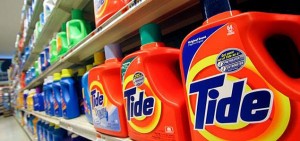P&G recently announced that it plans to remove phosphates from all of its laundry detergents by the end of 2015. A P&G representative reported that the company is able to eliminate phosphates because they’ve invested in technology that allows them to create a phosphate-free detergent that doesn’t compromise quality. Given that P&G currently holds 25% of the world laundry detergent market, this is big news for the environment. Not surprisingly, the announcement has been picked up by many major news sources and sustainability websites, and is receiving mixed reviews.
[Side note: according to Wikipedia, the problem with phosphates is that they eventually find their way into waterways, where they cause algae blooms which deprive the water of oxygen, and no oxygen means fish can’t survive.]
As with any “green” news, the critics are asking some tough questions. The primary one is “Why now?” Eco-friendly detergent brands such as Seventh Generation have been making phosphate-free detergents for decades. Furthermore, P&G itself stopped using phosphates in its U.S. and Western Europe-bound detergents in the ’90s due to environmental regulations, but it continues to sell detergents with phosphates in other countries. So what has sparked P&G’s interest in voluntarily going phosphate-free, and without pressure from external regulators? P&G claims they’re doing it because they finally have the technology to do so. Critics question if the decision is related to the decreasing availability and rising cost of phosphorus (the mined natural resource that is the base of phosphates).
To me, this looks like a decision that just makes sense – from an environmental and a business perspective. Even if the move is largely profit-driven, is that such a bad thing? If we look at other companies that have invested in Eco-friendly initiatives, I think we’d find that many did so because of long-run profitability. For example, would any car company have invested in hybrid car technology if fossil fuels weren’t scarce? I don’t know the answer, but as a business student I assume that most companies don’t make decisions based on environmental sustainability alone. I suppose this creates a bigger question: Is the motive more important than the outcome?
Whatever the reason, I think we would all agree that this is a good move by a big company that has the power to change the entire market. Looks like Jason Clay’s TED talk was bang on.
Original article: http://www.theguardian.com/sustainable-business/proctor-gamble-remove-phosphates-laundry-soap


